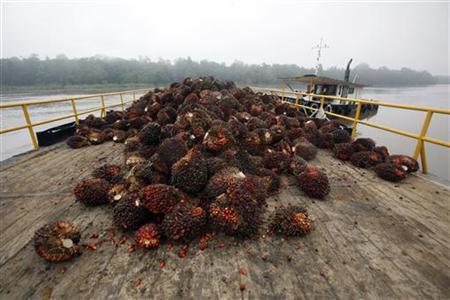Reuters
Jun 3, 2009
Competitors behind palm oil slurs according to industry boss
Reuters
Jun 3, 2009
By Sunanda Creagh
JAKARTA (Reuters) - Western countries are using climate change as an excuse to constrain palm oil production in Asia because it competes with Western business interests, Indonesia's palm oil industry chief said on Wednesday 3 June.

Indonesia and Malaysia produce most of the world's palm oil -- a product used in cooking, chocolate, cosmetics and as a biofuel -- but vast areas of forest have been cleared in both countries since the 1980s to fuel a boom in palm oil production.
Environmental groups including WWF and Greenpeace have called on Indonesia to curb deforestation and palm oil expansion.
However, Joefly J. Bahroeny, head of the Indonesian Palm Oil Producers' Association, said that NGOs could be part of a campaign driven by Western business interests in competing commodities such as rapeseed, soybeans and fossil fuels.
"It's all about business," he told a forum of palm oil producers.
"Palm oil has become a competitor as biofuel not only with rapeseed products but also a real competitor to fossil fuels controlled by Western interests. Do these other people truly care about global warming? Or do they also want to get rich with the excuse of climate change?"
Bahroeny said his industry had been accused of killing orangutans, burning forests and selling a product high in cholesterol.
"Now it's climate change. We don't know their real reason but we are suspicious. What next?" he said.
Most of Indonesia's palm oil plantations are in Sumatra and Kalimantan, areas that have large areas of forest and carbon-rich peat lands.
I Nyoman Suryadiputra, a scientist from Wetlands International, said clearing and draining the peatlands to plant palm oil causes the soil to release huge amounts of carbon dioxide into the air, which worsens climate change.
Carbon dioxide is the main greenhouse gas and is released from burning fossil fuels as well as deforestation. Large amounts of CO2 are released annually during the dry season in Indonesia through slash-and-burn agriculture and burning of forests.
The Indonesian government earlier this year lifted a moratorium on palm oil expansion into peatlands and the industry may now develop peat bogs less than three meters deep.
Bahroeny said he expected big palm oil expansion by members of the association in East Kalimantan in the near future and that his industry helped to alleviate poverty in rural areas.
He also said he was suspicious of a U.N.-backed scheme called reduced emissions from deforestation and degradation (REDD), which allows developing countries to raise potentially billions of dollars in carbon credits in exchange for conserving forests and peatlands.
Environmentalists dispute the palm oil industry's views.
"The people that will be worst affected by climate change are not the people in the Northern economies but people like us in developing countries," said Fitrian Ardiansyah, climate and energy campaigner with WWF Indonesia.
(Editing by Sara Webb)
© Thomson Reuters 2024 All rights reserved.


























